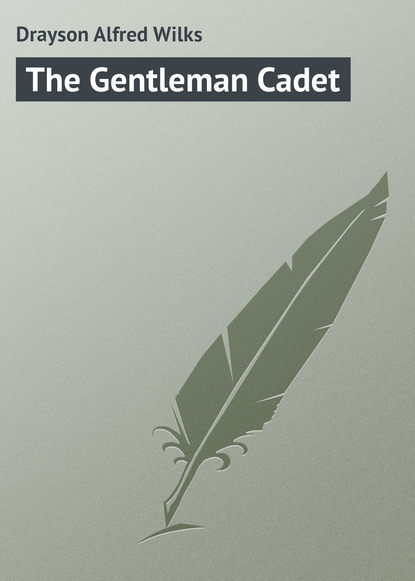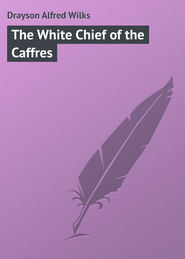По всем вопросам обращайтесь на: info@litportal.ru
(©) 2003-2024.
✖
The Gentleman Cadet
Настройки чтения
Размер шрифта
Высота строк
Поля
I was in the rear of the division, and dressed in plain clothes; my hat was what modern slang would term “a top hat,” and what in those days we called “a beaver.” This beaver I was rather proud of; it was only the second one I had possessed, a cap having previously done duty for the covering of my head. As I approached the dining-hall, a cadet who was a neux in my division whispered to me, “Look out for your hat!” Thinking that this meant that my hat might be spoilt if I let it rest on the floor instead of hanging it up, I said, “All right!” and marched on in the crowd of cadets, who now broke their ranks as they entered the portico leading to the hall.
Suddenly, and without any warning, a heavy blow was given on the top of my hat, which sent it down over my ears and eyes, and at once prevented me from seeing anything. As I raised my hands to force the hat up, half-a-dozen more blows were showered on my head with no light hand. I succeeded in pushing off my hat, the crown of which was knocked in, but could not see who had struck me – all the cadets looking much amused, but no one appearing to have been the guilty party.
Every cadet at once sat down at a table, there being about twenty tables in the hall; but, being uncertain where I ought to go, I stood in the middle of the hall, a mark for compressed balls of bread, a shower of which quickly rained around and on me.
The officer on duty, who had been detained outside to speak to a cadet, now came into the hall, and each cadet stood as rigid as a statue till the officer, calling to the senior cadet, said, “Say grace?”
The senior cadet in a loud voice shouted, “For what we’re going to receive may we all be thankful!” and the cadets then sat down.
I had remained standing all this time, and the officer, now remembering me, came up and said, “You take a seat at this squad.”
I sat down at the squad where there were four cadets on each side, and one old cadet at the head of the table; they were all strangers to me, and I looked all round the hall to find Fraser or the others of Mr Hostler’s who had come up for examination, but I could see none of them.
“Now then, sir,” said the head of the dinner-squad, “how much longer are you going to stare about before you peel the potatoes?”
I was surprised at this request, but the cadet opposite me pushed a plate of potatoes towards me that had been boiled with their jackets on, and signed to me that I was to peel these for the head of the squad. I commenced the operation, but was very clumsy at it, never having attempted such a performance before. I finished, however, after a fashion, and passed the plate up the table, and received in exchange a plate of meat which the cadet at the head of the table had cut for me.
“Snooker! beer!” said the cadet.
I saw a large jug of beer and a small mug near it, so I tilted up the jug and poured out a mugful of beer and passed this up the table.
When the cadet saw this he said, “What do you mean, sir, by pouring out my beer like that! Put it back and froth it! By Jove! if ever you pour out beer like that again I’ll have you over to my room and give you an angle of forty-five!”
I poured back the beer into the jug, and again filled the mug, this time taking care to froth it.
The meat that we had for our dinner was hard and tasteless, and was of a most inferior description. Our meal consisted only of meat, potatoes, bread, and the thinnest of beer, termed “swipes.” In those days the food of the cadets was scarcely fit to eat, the tea and coffee were most inferior, and the ration of bread and butter allowed us scarcely sufficient for half the number. That an alteration in this particular was much needed was not long after discovered, but, at the time of which we write, the cadets could scarcely have lived had it not been for the additional food they obtained from pastrycooks in the neighbourhood, or that was smuggled into barracks at various times.
After our dinner a quarter of an hour elapsed before we “fell in” for academy. Luckily I found Jenkins, a boy from Hostler’s, who had gone to the Academy a half-year before, who told me that I joined the last squad or division which was now termed “a class,” otherwise I should have made a mistake.
The class I joined was called the fourth class, and on a cadet, who was a corporal, reporting “all present,” we were marched into the class-room where we were to study.
On looking round at my companions I now found that I recognised several cadets as the candidates who came up for examination with me, and one or two nodded to me, but as we were ordered by the corporal who was in charge of the room to take our seats, I had no opportunity of talking to them. I looked round the room to find some of my companions at Hostler’s; I thought it would be great fun to see their surprise at my having passed. I expected to see Fraser high up in the class, and also Fuller and Hunt, and one or two others who at Hostler’s were in the first class, and were always held up to me as examples of learning. Low down in the class I saw a cadet who had been at Hostler’s; he was called Smart, and was considered rather a dull boy; but, seeing none of the others, I concluded they must be in some other room.
As I was re-examining my companions, the cadet in charge called out, “Shepard, look to your front! If I see you locking round again I’ll put you in arrest?”
I now sat looking straight before me, until called by the mathematical master to the octagon, where I was given some work to do, and again took my place at my desk.
On coming out of academy I met Smart, who hook hands with me and congratulated me on passing. “It’s quite wonderful,” he said; “and Hostler, I hear, is tearing his hair with rage at it, for he laughed at the idea of your having a chance.”
“Where is Fraser,” I inquired, “and Fuller, and all those fellows that came up?”
“They are all spun, and I’m the only one from Hostler’s who has passed this time. Fraser now is too old, even if he could get another trial, which he can’t. I often thought I could beat Fraser and Hunt at exams, for they used to cram fearfully – but how you must have worked!”
“Well, I didn’t seem to work so much,” I replied, “though I got on very fast. It was Mr Rouse’s style of teaching that was so good.”
“Hostler says you are certain to be spun at your probationary, as you must have been crammed just for this examination.”
“What is a probationary?”
“It’s the exam, you have to pass at the end of a year. If you don’t pass that satisfactorily, you are sent away from here.”
I then inquired of Smart whether, on his joining, he had met with the same rough treatment that I had, and he informed me he had experienced much the same. The head of his room was a very good fellow, and not at all a bully; but that two cadets who had been smashed from corporals were in his division, and were “awful bullies.” He also informed me that Timpson and Snipson had the reputation of being the greatest bullies in the Academy.
Smart had to leave me, as he had to go down town for the head of his room, and, on leaving, recommended me to get my uniform as soon as I could, for as long as I was in plain clothes I was a mark to be bullied.
Nothing remarkable happened during the remainder of the day. At half-past nine an officer came round the rooms, and received from the senior cadet a report to the effect that all were present, that no lights were concealed in the room, and that he had no intention of procuring a light.
The fire was then raked out and the candles carried off by a servant who accompanied the officer, and we were left to get into bed in the dark.
I now missed the luxury I had enjoyed at Rouse’s, viz, of a room to myself, for my two companions were talking so that I could not go to sleep; and tired as I was, and bruised with the blows I had received, I longed to get to sleep.
As I lay thinking over all the strange events of the day, and what a world of itself the Academy was, Snipson shouted out, “Shepard! call me at five to-morrow morning – not a minute later, mind, or I’ll break your head for you!”
I was wondering how I was possibly to wake at five, when I heard a knock at the door, and on Holms calling, “Come in!” a cadet said, “The fourth of the room is to go to No. 16.”
I did not at first realise that this had anything to do with me, till Snipson shouted, “Shepard, you’d better look sharp, or Foxey will half kill you?”
“What am I to do?” I inquired. “Do, you donkey? why, dress – and sharp too – and go to No. 16! Foxey will soon show you what to do!”
I got up and groped for my clothes, and dressed as well as I could in the dark. I then inquired of Snipson which was No. 16.
“Why, you’ve been here all day, and do you mean to say you don’t know which 16 is yet? You must go and find out; and I’d advise you to be sharp, for Foxey isn’t to be trifled with!”
I went out of the room, and tried to remember whether I had noticed 16 on any particular door. I could not recall that I had done so, and, hearing some talking at the end of the passage, I went to a door and knocked. I was told to “Come in!” and, on entering, was asked who I was.
I replied, “Shepard; and I was told to come to Foxey in No. 16.” There was a shout of laughter from two cadets in the room as I said this, whilst the cadet I first spoke to said, —
“Come here, sir! Who told you to come to Foxey?”
“Snipson, the second in my room.”
“Take that for your impertinence, now; and, when you go back, tell Snipson I will kick him to-morrow!”
The article which I was to take was a boot that was hurled at me by this cadet, whose nickname I afterwards ascertained was Foxey – a title that gave him great offence.
After having served as a target for a pair of boots, which I had after each shot to bring back to the cadet, I was asked if I could sing. Now it happened that one of our men-servants had been a sailor, and had learnt some of the popular sea-songs of the times. These I had heard him sing when I was quite a boy, and soon learnt the words, and also to sing them. Among these were “The Bay of Biscay,” “Tom Bowline,” “The Admiral,” “The Arethusa,” “’Twas in Trafalgar’s Bay,” etc. In answer to the inquiry whether I could sing, I replied that I thought I knew a song.
“Then we’ll have it presently,” said the cadet. “Now, snooker of No. 10!” he continued, “have you made out that ode to the moon yet? I’ll give you another licking if you tell me again you can’t!”
I now found there were several other cadets in the room, all last-joined, like myself; and, from the remarks made, I found that they had some task set them. The cadet addressed replied in a half-blubbering manner, “I’ll try to say something now.”
“Get onto the table, then,” said the cadet, “so that I may have a fair shot at you if you break down! And now go on, sir! You can’t sing, so you must make an ode to the moon! Now then, sir, commence!”
The cadet, who had now mounted on the table, had evidently had a rough time of it. He was a little fellow, whom I had seen belonged to our division, and who was very fat, and looked very stupid. As he stood on the table he was crying, either from fear or from the punishment he had received, or from both combined.
“Now, sir, will you commence?” said the cadet who was the head of the room.
In a tremulous voice that made the words uttered sound more ridiculous than they otherwise would, the cadet on the table said, “O moon, how splendid you are! How beautiful you look! And you light up the night! You are full sometimes, and then you shine bright!”









